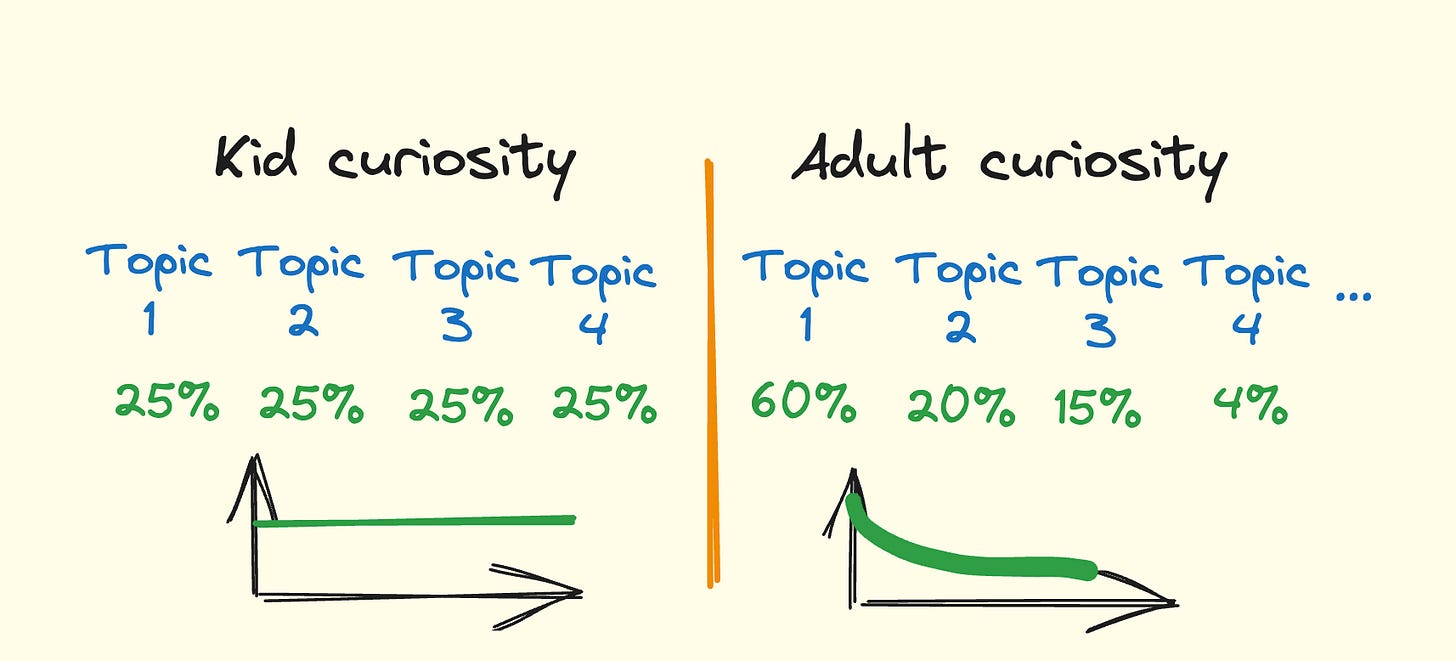Assorted thoughts on Curiosity 🤔
How cats are getting killed?
Just today morning, I was curious about Bajaj Qute as I took Uber Auto (it’s surprisingly spacious vs how it looks) and had a chat with the driver on why he got that instead of auto. I dont plan to use that information anywhere, but at that moment, I just wanted to know about it.
I look back at my childhood and realise that I was never this curious about things. But I’m more curious now than I’ve ever been and that is accelerating at a pace that I’m quite happy with.
And I was thinking why that flip has happened.
Curiosity - a strong desire to know or learn something.
Generally, curiosity comes from a place of knowing something already about a topic and then wanting to know more about it.
Lack of curiosity
As we invert that definition, lack of curiosity means a lack of desire to know something.
Where does that come from?
It comes from either a complete lack of knowledge about a topic or paradoxically, an illusion that you know everything and that there is nothing more to learn.
For the longest time, I’ve been a voracious reader. And that reading was a way for me to build that illusion, that I knew everything. I bet most of the experts doling out gyaan on Twitter are in the same boat. It wasn’t until a lot of execution started that I realised that I actually dont know a lot of stuff.
And the realization of that gap has helped build curiosity.
Goal-seeking curiosity
This is most seen in career moves. Once you decide to switch to a field or role, you generally would want to know even more about the same.
You might ask - but weren’t you already curious about the field if you are deciding to switch to it?
Yes, and that gets amplified much more when you actually move to it.
I’ve seen this in my life from time to time as well. There’s a seed of work I want to do, then I immerse myself more into it and want it even more.
Apparently, GenZ calls this manifestation?
Open-ended curiosity
My nephew is almost 3 years old now, and has started asking questions about everything. That’s open-ended curiosity in humans. I say humans, because if kids have it without being taught, it must be natural.
For a variety of reasons including education, that open-ended curiosity goes down the drain.
However, if you have developed enough curiosity for goal-seeking, I think open-ended curiosity is just a leap away.
Here’s an example:
let’s say you became curious about product management because you wanted to move to that role
Product management is the art and science of building products. So by extension, you should be curious about building products.
Everything around us is a product someone made, be it apps, chairs, cars etc. So you can extend your curiosity to not just software, but all kinds of products. Note that you dont need to be equally curious about making a car as you are about making an app, however, by extending your contours of curiosity, you can still get a lot of lateral perspective.
Once you start doing that, you’ll realise that you will atleast be a little bit curious about most things around you.
And honestly, this is just one thread, there can be so many such threads you can steer your curiosity in.
But the open ended curiosity of a kid is different from that of an adult. A kid’s curiosity is sort of an uniform distribution, equally curious about some things, achieving some depth and then switching attention to something else. An adult’s open ended curiosity can be much more directed, more indexed on some topics than others.
There are a few forces that stop curiosity from manifesting well:
Illusion of knowledge
Thinking that you know everything that is to be known
Strong focus on efficiency
if you have a very strong “what will I get out of this” mindset, it’s unlikely you will be curious about most things. Put it differently, curiosity is like a walk in the woods vs a 100m sprint. A walk is never efficient on the outset. So, if you can’t saunter intellectually, you’re unlikely to be able to be curious
Denial
An illusion of knowledge often gets debunked in the face of reality, and it matters how you deal with that knowledge-shattering event. If you deny it in any way, you’re unlikely to develop curiosity about it.
Passivity
Like any plant, curiosity needs nurturing or it dies. And just like plants, there might be some topics for you which require less active maintenance and some that require more. If you’re lazy and/or unwilling to put that maintenance, it will not work out.
I believe, like most things, curiosity can be developed. The question ultimately comes down to if you have enough courage to walk into the woods?



